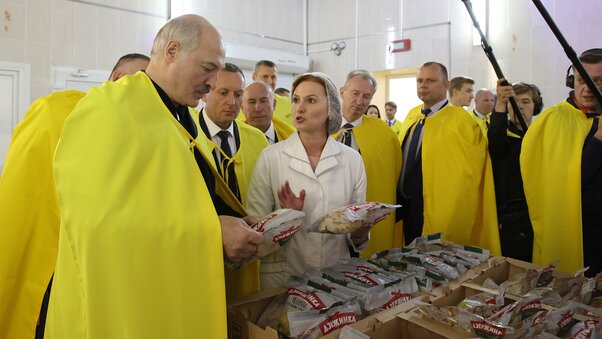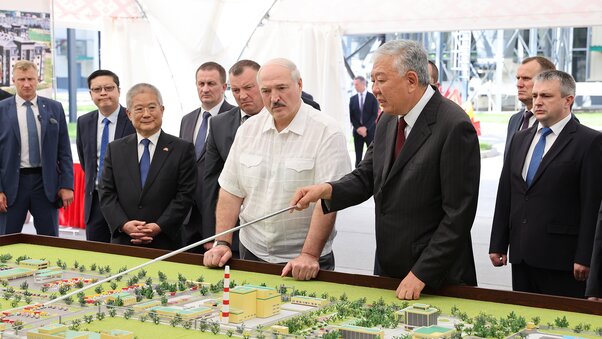Working trip to Vitebsk Oblast
- 12
- 6:38
Belarus President Aleksandr Lukashenko paid a working visit to Tolochin District, Vitebsk Oblast, on 13 October.
The head of state got familiar with potato production prospects at the example of the Tolochin Canning Factory which has been recently using the latest technology in cultivating, processing and storing potatoes. The President was briefed on the harvesting campaign in the country, and Vitebsk Oblast and Tolochin District in particular.
“We have harvested 8.1 million tonnes of grain, 838 tonnes of crucials and we will crop some 1.370 million tonnes of maize, although the yield is 15 centners down this year. On the whole, we will get 10.3 million tonnes of grain,” Food and Agriculture Minister Ivan Krupko told the President.
In his words, these figures are slightly lower than the preset goal of at least 10.5 million tonnes of grain. The head of state said that the result is not bad – over a tonne per every Belarusian citizen.
According to the minister, the agricultural production growth across all categories of Belarusian enterprises is expected at 105.5% by the end of the year. In his words, some Br7.9 billion has already been earned, Br1 billion up from the previous year. The profit made up Br444 million (up 22%).
“It will be great if we work like this every year. It is a difficult year, yet productive across all agricultural crops,” Aleksandr Lukashenko said.
Reviewing the performance of the agro-industrial complex, the President was interested in the activities of the integration structures recently set up in Vitebsk Oblast. The head of state was informed that little time (just about half a year) has passed and it is early to objectively assess the results. In general, it has had a positive effect and improved the state of farms. However, according to Vitebsk Oblast Governor Nikolai Sherstnev, enterprises that make part of the integration structures lack working capital for development. “In fact, they work only on the revenue they get, investing in the development of animal husbandry, crop production, construction and repair of farms, modernization. There is a lack of working capital,” he explained. There are also difficulties in purchasing agricultural equipment.
Aleksandr Lukashenko said that the state had already provided considerable support, including financial and logistics one, to the agro-industrial sector of Vitebsk Oblast and today it should count more on its own.
The President stressed that there are enough successful agricultural organizations in Belarus, including the Tolochin Canning Factory. Its experience should be replicated at other agricultural facilities. “Let them come and see what they do. We will have no problems in agriculture at all then. There are already enough of such [effective and successful] farms. Once there were 60 of them. Today we have hundreds of good farms. We need to adopt and replicate their experience. There is no other way to do it,” the President addressed the governor, pointing to the good work of Anatoly Anyukhovsky, director of the Tolochin Canning Factory.
Today, the population is more likely to buy finished agricultural products rather than grow them on their own. The number of cattle on personal land plots has recently reduced: people prefer to buy meat and finished meat products.
“The main thing is that people should work honestly and responsibly in the public, private sector and on the farm. We are interested in people buying more, with their purchasing power getting higher,” the President said.
Consumers also make increasingly high requirements to vegetable products. For example, washed, sorted and packed potatoes sell better in retail chains. Taking this trend into account, the Tolochin Canning Factory implements modern technologies in potato sorting, storage and processing, and uses high-quality elite varieties. There are also novelties of domestic selection. The head of state was briefed that a new variety of potatoes (of unusual purple color) will soon appear in stores.
According to experts, consumers in many countries have already appreciated the useful properties of colza. This agricultural crop is in great demand. This year the Tolochin Canning Factory has increased colza production six times. The profitability of this crop is one of the highest at the plant. It is expected to make up some 40% this year. “Colza is in great demand in Europe and China. We are still to appreciate its value in full. This is a very useful crop,” Aleksandr Lukashenko said.
The head of state got familiar with potato harvesting on Belarus’ biggest potato field (900ha). The President also asked about the availability of harvesting equipment and instructed to provide the factory with two new Gomselmash and Lidselmash harvesters.
Aleksandr Lukashenko also talked to farm machinery operators, discussed advantages and shortcomings of the agricultural machines as well as field work with them. The company’s director Anatoly Anyukhovsky noted that such workers take care of virtually all the work and have to work seven days a week during the busy season. “We will handle everything. One cannot but accomplish everything with this kind of people. They are genuinely hardworking farmers,” he stated.
Aleksandr Lukashenko noted: “If we had that kind of people in Minsk, we would be the richest ones.”
Aleksandr Lukashenko also visited the potato storage facility of the Tolochin canning factory. The complex of installations that includes machines for washing, dry peeling, and prepackaging potatoes was commissioned in 2015. The potato storage facility is automated. The building was erected using a Dutch technology.
The head of state was made familiar with the technology used to prepare potatoes for storage. He also examined the company’s product lineup. The company’s director Anatoly Anyukhovsky said the company intends to build another potato storage facility. Aleksandr Lukashenko promised support if the company needs it. “A storage facility is a sacred place. You shouldn’t plant potatoes if you have nowhere to store it,” he said.

